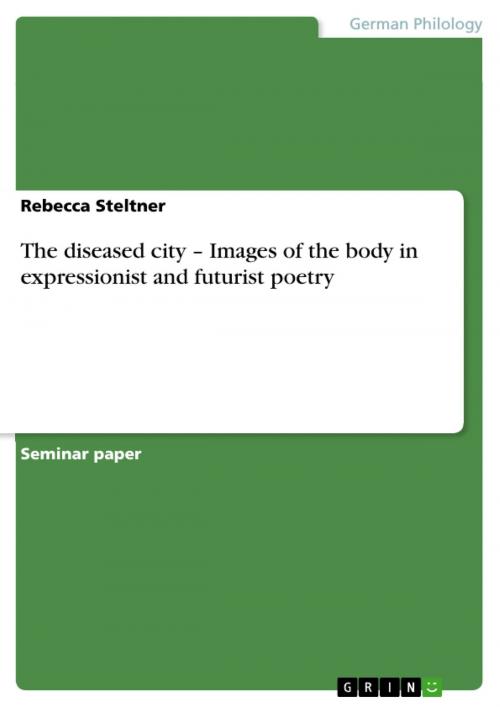The diseased city - Images of the body in expressionist and futurist poetry
Fiction & Literature, Literary Theory & Criticism, European, German| Author: | Rebecca Steltner | ISBN: | 9783638518826 |
| Publisher: | GRIN Publishing | Publication: | July 9, 2006 |
| Imprint: | GRIN Publishing | Language: | English |
| Author: | Rebecca Steltner |
| ISBN: | 9783638518826 |
| Publisher: | GRIN Publishing |
| Publication: | July 9, 2006 |
| Imprint: | GRIN Publishing |
| Language: | English |
Seminar paper from the year 2004 in the subject German Studies - Comparative Literature, grade: 70 (1), University of Cambridge (Faculty of Modern and Medieval Languages), course: The City, 25 entries in the bibliography, language: English, abstract: Where the Futurist's City Symphony is a celebration of 'the Joy of Mechanical Force', the Expressionist's is dark and apocalyptic. Cities in this poetry are centres of disease and disgust. They are industrial to the extent that they are equated with factories as pars pro toto. Life in the country-side or in the city could not be more different or the rift between the rich and the poor greater. R.H. Thomas comments that between 1890 and 1912 production in Germany was already industrial, whereas society was still far from industrial. The reason being, that in Germany industrialisation set in much later than in the UK and was compressed into just three decades. It is a time when the cities were 'reborn' and the images of the city changed dramatically, some of which I want to argue still exist in our common imaginary today. There are several fields of images that contribute to the representation of the city, they are: apocalyptic visions of technology and the decaying body, disease and sexuality, but also the Ich-Zerfall (ego-decay) can be seen as being triggered by the experience of the city as Simmel elaborates and when the Expressionist poets write about nature, it only really exists in relation to that city whose red smoke always lurks in the background, its smoke can be tasted everywhere. The city is the main theme of all these poems not just the backdrop and they address city issues directly. However, much has been written about the representation of the city in connection with technology, factories and alienating working conditions, which lend themselves to a Marxist analysis. This is not what interests me here, instead I want to approach the city on a sideway, using sociological theory of the body as put forward by Turner and Benthall and later explore the links between 'body aesthetics' and 'machine aesthetics' and see where they overlap.
Seminar paper from the year 2004 in the subject German Studies - Comparative Literature, grade: 70 (1), University of Cambridge (Faculty of Modern and Medieval Languages), course: The City, 25 entries in the bibliography, language: English, abstract: Where the Futurist's City Symphony is a celebration of 'the Joy of Mechanical Force', the Expressionist's is dark and apocalyptic. Cities in this poetry are centres of disease and disgust. They are industrial to the extent that they are equated with factories as pars pro toto. Life in the country-side or in the city could not be more different or the rift between the rich and the poor greater. R.H. Thomas comments that between 1890 and 1912 production in Germany was already industrial, whereas society was still far from industrial. The reason being, that in Germany industrialisation set in much later than in the UK and was compressed into just three decades. It is a time when the cities were 'reborn' and the images of the city changed dramatically, some of which I want to argue still exist in our common imaginary today. There are several fields of images that contribute to the representation of the city, they are: apocalyptic visions of technology and the decaying body, disease and sexuality, but also the Ich-Zerfall (ego-decay) can be seen as being triggered by the experience of the city as Simmel elaborates and when the Expressionist poets write about nature, it only really exists in relation to that city whose red smoke always lurks in the background, its smoke can be tasted everywhere. The city is the main theme of all these poems not just the backdrop and they address city issues directly. However, much has been written about the representation of the city in connection with technology, factories and alienating working conditions, which lend themselves to a Marxist analysis. This is not what interests me here, instead I want to approach the city on a sideway, using sociological theory of the body as put forward by Turner and Benthall and later explore the links between 'body aesthetics' and 'machine aesthetics' and see where they overlap.















